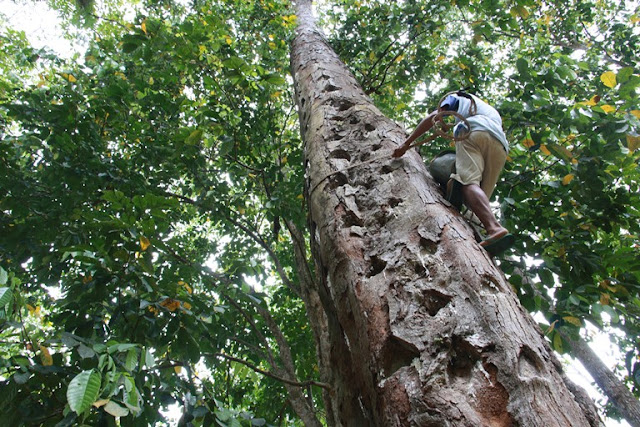Gum Damar: Unlocking New Possibilities in Eco-Friendly Materials
Introduction
Gum Damar, a natural resin sourced from Shorea tree species in Indonesia, is gaining attention as an eco-friendly material with untapped potential. Traditionally used in art, incense, and cosmetics, Gum Damar is now finding new applications in green industries. This versatile resin, abundant in Indonesia’s tropical forests, could drive innovation in areas like packaging, adhesives, and bioplastics.
What Sets Gum Damar Apart?
Gum Damar, extracted from Dipterocarpaceae trees, has a unique, glossy finish and mild aroma. Sourced mainly from Sumatra and Java, it’s highly valued for its purity, durability, and eco-friendly properties. Gum Damar is biodegradable, making it ideal for industries shifting away from synthetic materials.
Key Advantages of Gum Damar
- Biodegradable and Renewable
Unlike petroleum-based resins, Gum Damar is a renewable resource. It is also biodegradable, making it environmentally friendly. - Safe and Non-Toxic
Gum Damar is safe for food and skincare use, making it suitable for eco-conscious products. Its non-toxic nature supports sustainable product development. - Thermally and Chemically Stable
Gum Damar is resilient against heat and solvents, making it suitable for applications where durability is key.

New and Innovative Applications of Gum Damar
Traditionally used in varnishes and incense, Gum Damar now offers exciting possibilities across new fields:
- Bio-Based Packaging
With natural water-resistant properties, Gum Damar could be used in bio-based packaging. It could replace plastic films, extending food shelf life while reducing plastic waste. - Green Adhesives
Gum Damar’s adhesive qualities make it ideal for eco-friendly construction materials. As a non-toxic option, it could replace synthetic adhesives that release harmful chemicals. - Bioplastics and Compostable Items
Gum Damar is being explored as a component in bioplastics. Its thermal stability and biodegradability make it suitable for compostable utensils, containers, and eco-friendly packaging. - Waterproof Coatings
With its natural resistance to water, Gum Damar can be used in waterproof coatings for furniture, fabrics, and outdoor products. This could reduce the use of synthetic water-repellent chemicals. - Pharmaceuticals and Medical Applications
Researchers are exploring Gum Damar’s potential in drug delivery systems. Due to its natural properties, it may be useful in creating biodegradable capsules for slow-release medications.
Economic and Environmental Impact
Expanding Gum Damar production could benefit both local economies and global industries. For Indonesian communities, it means more jobs and sustainable livelihoods. Resin tapping, which leaves trees unharmed, supports forest conservation and long-term environmental health.
Challenges and Future Outlook
Challenges include the need for sustainable harvesting to prevent deforestation. However, proper guidelines and community-based forest management could enable responsible production. With rising interest in sustainable materials, Gum Damar’s potential is gaining global attention.
Conclusion
Gum Damar is evolving from a traditional resin to a key eco-friendly material. Its potential uses span packaging, construction, and medicine. With its eco-friendly attributes and sustainable sourcing, Gum Damar could soon be a cornerstone in green innovation, helping to shape a future where sustainability drives industry growth.
Contact us :
☎️ : +62 856-4868-8722
📍 : Jl. Ir.Soekarno, No.122, Dadaprejo, Junrejo, Kota Batu, East Java 65323